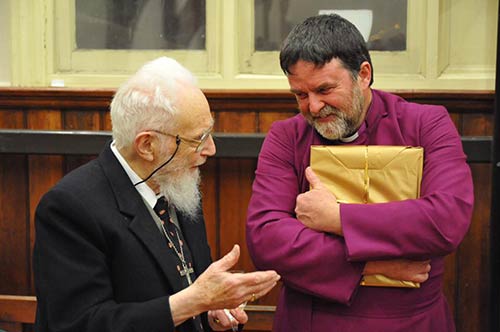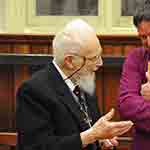
On Saturday, I concelebrated at the Funeral Mass for John De la Bere (23.11.22 – 23.6.17). I first met John in 1974 when I started my Mathematics and Philosophy degree, and John was a lecturer in the Mathematics Department.
I spent more time with him in more recent decades, mostly through St Michael’s – the church he loved.
NZ Anglican Prayer Book revision began in 1964, and a year later John joined the Provincial Commission on Prayer Book Revision and was on it until it wound up in 1990 after the publication of A New Zealand Prayer Book He Karakia Mihinare o Aotearoa in 1989.
So John was one of the sources for my research for my thesis, The Anglican Eucharist in New Zealand 1814-1989.
You see John mentioned on page 54 of my thesis. John prepared the Eucharistic Prayer for a revision of the 1966 Liturgy [The Commission called this particular revision 1/69(ii) – see page 103 in my thesis]. There is a very significant innovation in this draft. John did not simply have the congregation conclude the Eucharistic Prayer with a single “Amen”. Such a one-word response can end up being quite feeble – with a lot of people missing it, or some saying “Amen” after others already have. John’s solution was to have a paragraph, the doxology, that all say together – making for a resounding conclusion to the prayer:
All glory and honour is yours Almighty Father,
here and everywhere,
now and always.
Amen.
With the slight alterations of “is yours” to “to you” and “now and always” to “now and for ever”, this went through into the 1970 revision (and via the 1984 revision into the Prayer Book). Other Anglican revisions, internationally, took up the principle of expanding the people’s “Amen” with a doxology said or sung by all. There was a lot of cross-pollination in these days of revision. Many will have drawn the concept directly from John’s idea. At the very least one can say, he thought of it first.
In the heady days of charismatic renewal, ecumenical cross-pollination meant that Roman Catholic laity also started to recite the doxology with the priest in their now-also-in-English, post-Vatican-II Eucharistic Prayers. That practice grew to the point where they had to decide a rule about this in the Roman Catholic Church in the General Instruction of the Roman Missal #236.
John’s 1/69(ii) revision made another change – this time the idea was not original to him, but I suspect drew on his knowledge of Roman Catholic liturgical renewal. The acclamation after the Institution Narrative in 1966 was addressed (as was the rest of the prayer) to the Father. John suggested it be addressed to the Son:
(Amen) Come Lord Jesus;
your death we show forth,
your resurrection we proclaim,
your coming we arwait.
Glory to you, Lord Christ.
And then in the next revision (70/2) he swapped the lines. “Amen: Come Lord Jesus” and “Glory to you, Lord Christ” swapped places. At the Prayer Book Commission’s residential conference early in 1970, John then produced two further drafts, the commission chose one (70/5). Slightly adapted, this became the 1970 revision.
I tell these couple of stories to show the influence of John, including beyond these shores. They also highlight how significant he was, as a layperson, how respected he was, that the crafting, of what until 1984 was the sole Eucharistic Prayer, was primarily in his hands. We owe him. Including for his helping foster lay-clergy equality.
John had an unshakable faith in Christ and the resurrection. I conclude with the last words of his requiem, a service he himself planned in detail:
To Paradise now may the angels bring you
and may the saints and martyrs
come to meet you on your way
and may you be led into the Holy City, Jerusalem.
All the choirs of angels make you welcome there,
and with Lazarus, once so ill and poor,
may eternal joy be now for ever yours.
If you appreciated this post, do remember to like the liturgy facebook page, use the RSS feed, and sign up for a not-very-often email, …




He taught me algebra, in 1978!
Thanks, Peter. It is time for some work connecting Mathematics and Christian worship… Blessings.
He was a supportive and friendly man to me in my earliest days of my conversion when I attended St Michaels. I learnt much from him and respected him a great deal. A lovely and liturgical man.
My lovely grandfather, was so lovely to read about this side of his life and devotion.
Rest in Peace John